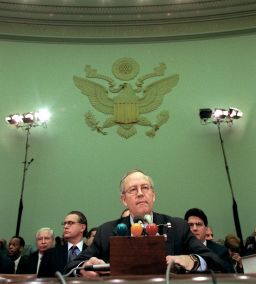Editor’s Note: Julian Zelizer, a history and public affairs professor at Princeton University and a CNN political analyst, is the author of “The Fierce Urgency of Now: Lyndon Johnson, Congress, and the Battle for the Great Society.” He’s co-host of the “Politics & Polls” podcast. The opinions expressed in this commentary are his own.
Story highlights
Julian Zelizer: President Clinton was able to undercut a special prosecutor
But that situation was vastly different from the one facing President Trump
President Trump is taking a page out of former President Bill Clinton’s playbook. Facing an expanding investigation, the President has been lashing out against the independent investigators. His first target was former FBI Director James Comey who the President dismissed as “very cowardly” and as a “nut job.”
The new target of President Trump’s fury is the special counsel investigating Russian intervention in the 2016 election and possible ties between Trump campaign officials and the Russians. Robert Mueller, who is leading the probe, is a former FBI director whose impeccable credentials have earned him extensive praise from the GOP.

Although POTUS has remained relatively silent about the special counsel, his surrogates have not. One of President Trump’s close friends, Christopher Ruddy, chief executive of Newsmax, floated a trial balloon Monday when he suggested that the President was considering terminating Mueller at this position.
Former Speaker of the House Newt Gingrich alleged that Mueller is on a “witch hunt.” Gingrich warned that Republicans would be “delusional” if they thought that Mueller “is going to be fair.” Sounding very different than the person who just a few weeks ago heaped praise on Mueller when he took on this new job, Gingrich now pointed out that some of the lawyers who Mueller has hired for his staff have made contributions to Democratic candidates.
In launching these attacks, President Trump and his surrogates are trying to do to Mueller, and to Comey, what President Clinton did to Independent Prosecutor Kenneth Starr during the investigation into his administration in the 1990s.
Ken Starr had been appointed by a three-person panel of judges in 1994 to investigate a scandal involving land development deals in Arkansas from the time before Clinton became president.
Starr, a conservative Republican who had served as Solicitor General of the United States, took over from Robert Fiske and proved to be an aggressive prosecutor. Over time, Starr broadened the scope of the investigation to include a number of issues, including accusations that had been brought against the President about sexual harassment. In the course of the investigation, Starr’s team asked President Clinton about whether he had an affair with a White House intern named Monica Lewinsky who was about half his age. Clinton, seeking to protect himself and his marriage, lied under oath. He also lied to the nation when he said “I did not have sexual relations with that woman, Ms. Lewinsky.”
Starr and the House Republicans, led by then Speaker Gingrich, moved to impeach the President on the grounds that he had perjured himself, tampered with witnesses, and attempted to obstruct justice.
Congressional Democrats, who didn’t have much love for President Clinton given his proclivity to compromise away their principles, rallied to his side believing that the impeachment was a partisan effort to overturn the results of the 1992 and 1996 elections.
Fighting back
Realizing that the impeachment process was judged in the political, not legal arena, Clinton his team fought back in the court of public opinion. Not only did they continue to deny having done anything warranting impeachment, but they also went on the offensive by painting Independent Prosecutor Starr as a fierce partisan, part of what Hillary Clinton called a “vast right-wing conspiracy,” that didn’t really care about what the framers intended to mean by high crimes and misdemeanors. Clinton’s supporters suggested that Starr, along with Speaker Gingrich, trumped up an irrelevant affair to bring down the president.
The strategy worked like a charm. While the House Republicans voted to impeach President Clinton they could not obtain any substantial Democratic support which would have been essential to giving the charges bipartisan legitimacy. In the Senate, there were enough Republicans who didn’t believe the charges warranted Clinton’s removal from office.
Recalling the strategy that he helped to put into place, Clinton advisor Dick Morris said: “Clinton only survived a special prosecutor because he made Ken Starr the enemy.” Clinton ended his presidency with skyrocketing approval ratings – 73 percent in late December 1998 at the time the House voted to impeach him – in contrast to congressional Republicans who suffered in the polls. Clinton’s approval numbers remained strong for the rest of his term.
Democrats gained five seats in the 1998 midterm House elections, while Democrats did well in numerous gubernatorial elections. Gingrich was forced to resign because of an affair of his own as well as political ineptitude. Congress allowed the law that created the Independent Counsel, passed in the aftermath of Watergate in 1978, to expire.
While Trump’s strategy can certainly cause some damage, it’s not clear that it will work. The most important difference is that now Republicans are in charge of the House and Senate. Clinton was able to connect Ken Starr to a Congress that was controlled by his highly partisan opponents.
In contrast, Republicans currently control both chambers and are handling the public investigations. North Carolina Sen. Richard Burr, chairman of the Senate Intelligence Committee, is not exactly a long-haired hippie out to get the Commander-in-Chief. Rod Rosenstein, the Deputy Attorney General is the person is the person responsible for appointing Mueller, not an independent panel of judges and not a group of Democrats.
This scandal is more serious
The scandal at the heart of this investigation is also much more serious than what Starr was looking at in the late-1990s. When Starr investigated, the most damaging case that he could find against President Clinton revolved around his perjuring himself about oral sex in an effort to hide his private life from prosecutors, legislators and the media.
Trump’s scandal is about the potential corruption of the election process and the possibility that for financial or political reasons, the Trump campaign colluded with the Russians in undermining our democracy. The obstruction charges with Clinton revolved around his trying to hide the affair. Today’s obstruction is about the President leaning heavily on the FBI Director to get rid of the dark cloud hanging over his Oval Office. The firing of Comey looks much more like President Nixon firing the special prosecutor Archibald Cox than it does than Clinton’s friend Vernon Jordan helping Lewinsky find a job at Revlon.
Clinton was a president who had successfully broadened his appeal over the course of his presidency, before the scandal broke. He had responded to the Republican takeover of Congress in the 1994 elections by moving to the center on key issues like deficit spending and welfare. He had won praise after white extremists bombed a federal building in Oklahoma by pushing for an aggressive counterterrorism program, even as many Republicans said no to growing government to protect the home front. He won reelection by large margins in 1996.
By the time that he and Hillary Clinton attacked Starr for being part of a “right-wing conspiracy,” the President was on much stronger ground than President Trump, who until now has just played to his narrow base and has done almost nothing to broaden his appeal. In a popularity contest with Robert Mueller, it is pretty safe to say that the Commander-in-Chief won’t come out on the winning side.
Starr’s role
Finally, Kenneth Starr was someone with a more vulnerable background. He was raised in a conservative Christian household in Texas. Although he became more sympathetic to Democrats in his college years, President Ronald Reagan nominated him for his judgeship on the United States Court of Appeals for the District of Columbia Circuit and President George H.W. Bush named him US Solicitor General in 1989.Starr who was been a registered for much of his life, was a key figure in a Republican administration.

Starr made many decisions during his investigation that didn’t help his case – for example, listening to Gingrich’s advice by releasing the 445-page impeachment referral to the public over the Internet filled with graphic descriptions of the President’s sexual escapades. During the House Judiciary Committee hearings, Starr advocated Clinton’s impeachment which exceeded his responsibility.
By contrast, Mueller, a Republican who is non-partisan in his outlook, was appointed to be the director of the FBI by President George W. Bush.
Neither Mueller, or the man who succeeded him at the FBI, James Comey, has really been a subject of conservative attack until now. In May, upon his appointment, Gingrich tweeted: “Mueller is superb choice to be special counsel. His reputation is impeccable for honesty and integrity. Media should now calm down.” Neither has been seen as particularly partisan and both have reputations as being passionate G-Men, to a fault in the case of Comey, rather than tools of either party.
None of this is to say that the attacks can’t be effective at blunting some of the fervor behind the questions and concern surrounding the White House.
Get our free weekly newsletter
But if President Trump, the polarizer, is hoping that the strategy will easily kill the multiple investigations, the odds are that he won’t be pleased with the outcome. With continued revelations that administration officials were dishonest about their contacts with the Russians and with President Trump’s habit to tweet statements more damaging to his own case than anything leakers have provided, it is hard for Congress or the Department of Justice to simply bring this matter to a quick close.
It is much more likely that Trump’s continued attacks on reputable figures, using the bully pulpit in the literal sense, could continue to chip away at the President’s approval ratings, undermine his ability to persuade members of Congress that there really is nothing “there” in the Russia probe, and plant the seeds for a wave election that gives control of the House to a party that won’t be quite as loyal or sympathetic as the Republicans after 2018.





